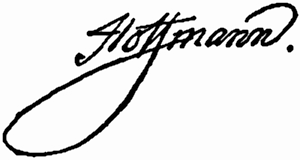„Exaltatione Grandissima“ (Julia Mark)
The diaries of the Bamberg period show extreme moods. An extract:
enthusiastic mood – exalted to madness – exotic – romantic – tender – cosy – uncomfortable – annoying – gallant – funny – quite – indifferent – discontented – infamous – cruel – cynical – poetic – cheerful – oddly tense – indifferent – scarf – senza exaltatione – piano – mezza voce – exaltatione grandissima
The secret erotic longing for Julia Mark, the 13-year-old singing student, becomes the alternating bath of emotions.
The unhappy passion for the young girl is limited to secret fantasies. There is rather a lack of joyful exuberance („senza exaltione“). A gloomy mood forms the basic tone for almost 2 years. The abbreviation […] is often used – alluding to the drama Das Kätchen von Heilbronn by Heinrich von Kleist, whose main character is an angelic child. Years later, Hoffmann wrote to his Bamberg friend and doctor Dr. Speyer:
„Tell her that the angelic image of all goodness of heart, of all heavenly grace of truly feminine meaning, of childish virtue […] cannot leave me at the last breath of life…“ (letter from 1.5.1820)
In 1812 Julia is engaged and married to the hamburg merchant Graepel (referred to in the diary as „Groepel“). Hoffmann falls into depression:
„It’s strange that as it were the color has disappeared from life and it seems to have gone deeper than I thought it would.“ (diary from 16.1.13)
Some Hoffmann researchers suspect that the real Julia stands behind some figures. They are mostly singers who seem to be unreachable as women (Donna Anna in Don Juan, Julia in Adventures in a New Year´s Eve night, Antonie in Rat Krespel, Julia in Kater Murr; Figures in Ombra adorata, the fermate, the Arthurhof, the church of jesuits in G., the election of brides).
The Bamberg narrative Messages from the latest fates of dog Berganza contains particularly clear echoes of the Julia affair („Cäzilia“) and its painful end. The talking dog Berganza tells of the drunken husband who approached Cäzilia in a rough way on the wedding night. Now the animal must become the protector of true innocence:
„Then I jumped angrily out on the bed, grabbed with a strong bite the scrawny thigh of the wretch, and tore it over the floor of the room to the door […]. By tearing him to pieces, that he lay there covered in blood, he raced in pain, and the terrible high tones which he cast out woke up the whole house“.
An author’s revenge fantasy? There’s a lot to be said about it. Also Kreisler as Hoffmann´s Alter Ego has his appearance, with which the „circle“ between music and madness closes – with Julia as center:
„The girl sang so excellently that I could see how the conductor Johannes Kreisler had only meant her when he spoke of the mysterious magical effect of the sound of the singer, whose singing lived in his works or rather wrote her poetry“ (from: Messages from the latest fates of dog Berganza)
